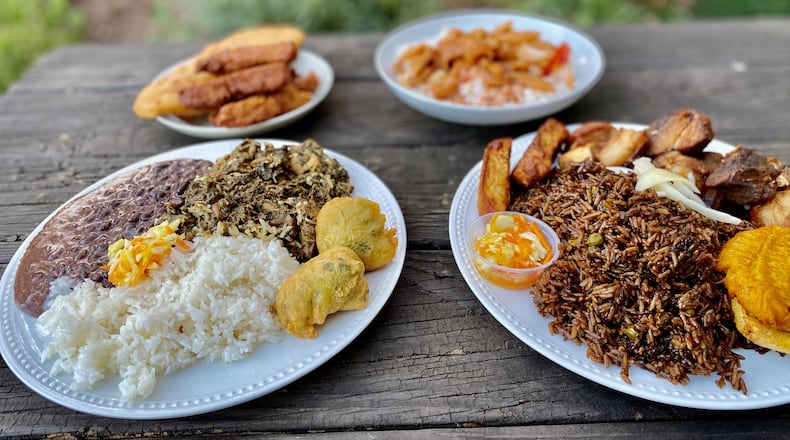Fried foods are ubiquitous in Haiti. In the capital of Port-au-Prince, you will see street hawkers selling fried pork (griyo), traditionally served with smashed fried plantains; crunchy brown fritters fashioned from grated yuca and malanga (akra); and, sometimes, poofy balls of seasoned fried dough (marinad). All together, these savory bites are called fritay (pronounced “free-tie”).
According to Francois Nau, owner of Jojo Fritay in Kennesaw, fritay is to Haiti what McDonald’s is to America — fast food.
Credit: Wendell Brock
Credit: Wendell Brock
And, yet, Nau — who founded the charming counter-service restaurant with his wife, Edith, and his daughter Jo in 2017 — wants you to know that the Caribbean Creole food of his homeland can be a great deal more complex than what comes out of the fry basket. It’s a cuisine redolent of prickly Scotch bonnets, aromatic garlic, ginger, herbs and citrus — ingredients that impart health, as well as flavor.
The Naus opened Jojo after Edith lost her job as a nurse. By then, Francois, now 51, had retired from careers as a maintenance engineer for Atlanta Country Club in Marietta, and as an electrical contractor. Jo, who had helped her aunt manage restaurants in New York, was called home to assist mom and pop.
Credit: Tercy Ugens Toussaint
Credit: Tercy Ugens Toussaint
While Nau worried about the family’s lack of experience in the industry, he also feared advertising the restaurant as a straight-up Haitian spot. “At the time, it was very risky to say, ‘Haitian cuisine,’” he said, referring to stereotypes about poverty and race. “But, you know, I decided, it’s Haitian cuisine, so why not name it Haitian cuisine? Period. And everybody will know it. If I succeed, I succeed. If I fail, I fail.”
Indeed, business was challenging at first.
“It was so tough that we were about to get evicted,” he recalled. “But, we fought through.” Eventually, word got out, and, today, customers turn out for the Sunday-only soups (joumou, made with winter squash) and bouyon (goat, dumplings, yams and carrots).
It probably helped that Jojo is one of just a handful of Haitian eateries in the area. That, and the fact that the cooking is exceptional.
Credit: Tercy Ugens Toussaint
Credit: Tercy Ugens Toussaint
Once the pandemic hit, the owners stayed the course. They had no choice. “If we close, how are we going to pay our bills?” Nau mused at the time. They pushed the tables to one side, and switched to takeout only. Today, sales have bounced back, he said.
My knowledge of Haitian food comes mostly from trips to Miami, known for its sizable Haitian community. While I knew about fritay and griyo, a good bit of Jojo’s fare was new to me.
Take lalo, a stew of crab, smoked turkey and pork that derives its green hue from the addition of nutritious jute and spinach leaves. I liked it very much with plain white rice, the excellent coconut-scented black beans and the pikliz (a condiment of spicy pickled cabbage and carrots).
The griyo likewise was excellent, especially with the giant portion of mushroom and rice pilaf that gets its distinctive black color from djon djon mushrooms. If this dish is available, you must try it. I also liked the lambi, a tender conch stew reminiscent of a New Orleans-style shrimp Creole.
Because the heaping plates are served with rice and two sides, you are likely to end up with a fried bite or two. On the whole, the fritters and fried veggies were superbly executed — not at all greasy, nor as filling as one might expect. Enjoy them in moderation. I like the spicy zing of the akra, and the fluffiness of the marinad, which resembles a broccoli or cauliflower floret, even though it’s just dough seasoned with herbs. A drink of freshly squeezed ginger, sweetened with sugar, made me feel a bit more virtuous about my feeding frenzy.
So, what’s Jojo’s secret? “It’s not all about the spices and the herbs,” Nau said. “Cooking Haitian food is an act of love. Love is our special ingredient.”
Is there a restaurant you want to see featured? Send your suggestions to ligaya.figueras@ajc.com.
JOJO FRITAY
Menu: Haitian
Alcohol: no
What I ordered: griyo with mushroom rice, fried plantain and fried sweet potatoes (white yam); lamb with white rice, black beans and akra; lalo with white rice, marinad and akra; pate kode (fried pastry with chicken); ginger drink
Service options: takeout; delivery via Grubhub, Postmates and Seamless
Outdoor dining: no
Mask policy: yes, for staff and customers
Address, phone: 1200 Ernest W. Barrett Parkway, Kennesaw; 678-540-2341
Hours: 11 a.m.-7 p.m. Mondays-Thursdays, 11 a.m.-8 p.m. Fridays-Saturdays, 12-8 p.m. Sundays
Website: jojofritay.com
Read more stories like this by liking Atlanta Restaurant Scene on Facebook, following @ATLDiningNews on Twitter and @ajcdining on Instagram.
About the Author
Keep Reading
The Latest
Featured





